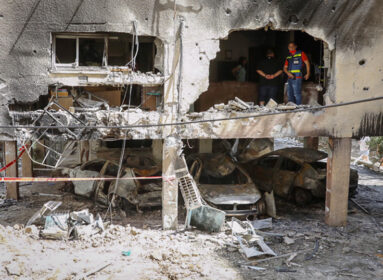
The corruption and rot of FIFA (Fédération Internationale de Football Association) has drawn the attention of US federal prosecutors and the jaundiced eye of American media. The attempt by the Palestinian Soccer Federation to have Israel thrown out of FIFA – not so much.
No wonder. After fits and starts, soccer has become wildly popular within the American baby boomer and millennial fan base. It has become a money maker in the land of the NFL, with hundreds of millions in international advertising and licensing for American companies like Coca-Cola, McDonalds, and Visa. Precisely because of this newfound popularity, it fell upon the United States to investigate the bribes and wire fraud conducted on its soil. Millions of appreciative European football fans, who for decades complained bitterly of FIFA’s blight, are today lauding Attorney General Loretta Lynch, turning her overnight into the most popular member of the Obama cabinet – sorry, John Kerry.
For 24 years, European sports and business journalists have uncovered secrets of the inner workings of the “non-profit organization” with $1.2 billion in cash reserves. The journalistic versions read more like a plot arc from a season of The Sopranos than the workings of an international sports federation. FIFA was visibly corrupt, yet seemingly beyond the reach of the law. For years it was alleged that countries bribed FIFA officials for hosting rights to its premier event – the World Cup. Qatar, a country where the temperature regularly hits 110 in the summer, bought them for the 2022 Cup.
But the price tag was chicken feed compared to the cost of international marketing rights. FIFA is the governing body for all the regional football federations with names like CONCACAF (North and Central America), CONMEBOL (South America), and UEFA (Europe), and owns the rights to all their regional tourneys. The money involved in these regional and international tournaments is mind-boggling. As a result, cash bribes passed from unscrupulous sports marketing executives to equally unscrupulous FIFA officials who in turn granted the marketing executives the right to sell FIFA’s product globally to downstream network, satellite and cable providers. Millions of unreported bribe dollars flowed through U.S. banks, and drew the attention of federal tax authorities. Seven senior executives of FIFA were arrested at the deluxe Baur au Lac hotel where the global FIFA leadership was gathering.
Left untouched for the moment in the first round of federal indictments is the former wedding singer-turned-international sports “godfather” Joseph S. (“Sepp”) Blatter, the Swiss president of FIFA. But his perp walk is only one co-conspirator’s confession away.
Even as Blatter was fending off a campaign of critics who coalesced around the FIFA presidential candidacy of Prince Ali Bin al-Hussein of Jordan (King Abdullah II’s brother), Blatter was simultaneously fending off a second, lesser controversy moving towards a conclusion on the floor of the Baur au Lac ballroom. In 2013, the Palestinian Football Federation, one of the 209 members of FIFA, submitted a proposal to have the Israel Football Association suspended. In recent years, FIFA had suspended Nigeria, Cameroon, Zimbabwe and others for governmental interference in national associations, but the PFF was calling for Israel’s suspension for a different set of violations. The PFF commissioner, former convicted PLO terrorist and Palestinian Authority security commander Jibril Rajoub, proposed ousting Israel from FIFA and its affiliated European football league (UEFA) for a range of human rights “violations” against Palestinian teams (travel restrictions on the Palestinian teams, racist chants at Israeli games, and failure to transfer tax revenues to the PFF), and for the presence of five Israeli teams beyond Israel’s green line in the occupied territory of the West Bank.
Thus, the Palestinian effort to ostracize Israel in FIFA was part and parcel of the Palestinian Authority’s effort to boycott and sanction Israel in international venues, orchestrated by a former terrorist who in 2013 fantasized on Lebanese television that if the Palestinians “had a nuke, we’d have used it this very morning.” To win a suspension vote, the PFF would need 75 percent of the FIFA membership.
That the Israeli national football squad currently plays in the extremely talented UEFA and not in the Asian Football Confederation (AFC) is the result of Israel’s expulsion from the latter in 1974, as all the AFC’s Arab football associations refused to play against Israel. For decades Israeli athletes have faced Arab opprobrium and boycott – but with the proposed FIFA suspension Rajoub was attempting to internationalize the boycott and isolation of Israel.
Blatter, as well as most of the members of CONCACAF and UEFA, opposed the PFF. Indeed, Blatter’s last international business trip before the FIFA vote was to Israel and Palestine, where he met with both Israeli PM Benjamin Netanyahu and the PA’s president Mahmoud Abbas. The Israelis argued that politics should play no part in international soccer, while the Palestinians wailed over the sins of occupation. It seemed that no compromise could be found.
If forced to vote, a simple majority of FIFA’s membership would likely have endorsed the suspension, but not the requisite 75 percent threshold. At the last minute, as FIFA was reeling from the arrests of its executive leadership the day before, Rajoub withdrew his motion. Israel would not be subjected to the embarrassment of formally seeing just how unpopular it had become.
But this was no grand diplomatic victory for Israel and for its football commissioner, Ofer Eini, former head of Israel’s Histadrut labor federation. In exchange for dropping its demand for a full-scale suspension vote, FIFA promised the PFF a commission (to be headed by former ANC South African leader and anti-apartheid activist Tokyo Sexwale) to monitor all of its complaints, and in particular to investigate the status of the five “illegal” Israeli teams operating in the West Bank. Israel for its part had to commit to dropping its travel restrictions on PFF players, and to covering customs and tax costs for imported gear for the Palestinian players. The linkage between Israel and apartheid South Africa was codified by FIFA in the formation of the monitoring commission.
Thus, there is no reason to celebrate Israel’s diplomatic “victory” at FIFA. Like the Horizon 2020 scientific association between the EU and Israel that was signed last year, the outcome at FIFA places Israel in a precarious situation. In 2014, it had to certify that not a single penny of EU scientific money would enter the occupied territories. FIFA will similarly conclude in due time that the five disputed national teams from the West Bank (in Ma’ale Adumim, Ariel, Kiryat Arba, Bik’at ha-Yarden and Jerusalem’s Givat Ze’ev) violate international rules. They will either have to be expelled from FIFA, or Israel will face FIFA censure somewhere down the line.
To put it in football parlance: Israel may have avoided a red card, but it got a yellow from the referee in Zurich. Given the rot of FIFA, it might be a badge of honor to be tossed out of such a criminal cartel. But no Israeli sports fan would revel in it. In the absence of a peace process leading towards a two-state solution, Israel can expect its FIFA problem to remain on the pitch.








 Southern New England Jewish Ledger
Southern New England Jewish Ledger













